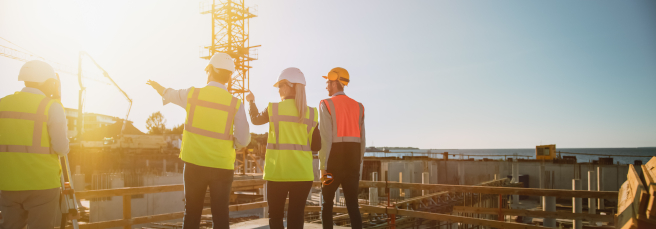

A commercial building survey is one of the most important steps in any property acquisition or lease negotiation. Whether you’re investing in a retail space, warehouse or an office building, the insights provided by a qualified building surveyor can mean the difference between a sound investment and a costly mistake.
Your surveyor’s findings influence purchase decisions, help negotiate prices, and identify potential issues that could affect your business operations. So, choosing the right building surveyor is more important than ever. Follow our guidance on how to choose the right commercial building surveyor for your needs.
Check Their Qualifications
Professional qualifications are the foundation of a surveyor’s expertise and they’re a non-negotiable when choosing a surveyor for your project. The Royal Institution of Chartered Surveyors (RICS) membership is widely recognised as the gold standard in the industry, indicating a high level of professional competence and ethical standards.
The Chartered Institute of Building (CIOB) is another recognised professional body for construction and property professionals. It sets standards for education and professional practice in the construction industry, ensuring your surveyor has met rigorous standards of education and training, and adheres to ethical standards in their work.
Beyond basic qualifications, surveyors should also maintain active licenses and demonstrate commitment to continuing professional development. This ensures they stay current with the latest building regulations, survey techniques, and industry best practices. When evaluating qualifications, look for chartered status and specialist certifications that are relevant to commercial property.
What Services Do They Offer?
Professional building surveyors should offer a comprehensive range of services tailored to commercial properties. These might include dilapidation reports or planned preventive maintenance schedules, for example. The scope of their services should align with your specific needs, whether you need a basic structural assessment or a detailed analysis of building systems. Pay attention to how they structure their surveys and whether they offer customisable service packages to meet your particular requirements.
What Technology and Equipment Is Used?
Building surveying techniques have evolved beyond visual inspections and measuring tapes of years gone by. Leading surveyors today utilise advanced technology such as thermal imaging cameras, moisture meters, and drone technology for comprehensive building assessments.
Certain pieces of equipment allow for greater access to a more comprehensive report. Pole cameras, drones and cherry pickers, for example, can enable surveyors to get a different view of the property and help them read hard-to-see areas like overhangs or gutters. This visibility provides a full inspection and can allow for physical issues like loose sheet fixings, trapped water beneath coverings, and brittle or damaged materials that might otherwise be missed.
Digital reporting systems also allow for detailed documentation and analysis of their findings. The use of this equipment not only improves accuracy but also enables surveyors to identify issues that might be missed through traditional methods. Consider how potential surveyors integrate technology into their work and whether their technological capabilities match your needs.
Cost Considerations
While cost shouldn’t be the primary factor in selecting a building surveyor, it’s important to understand their fee structure and ensure it provides value for money. Quality commercial building surveys require significant time and expertise, and cutting corners to save money can be costly in the long run.
Be sure to request detailed quotes that outline exactly what’s included in the service, and be wary of unusually low quotes, as they might indicate a less thorough approach or hidden costs. Consider the potential cost implications of missing serious defects when evaluating survey fees.
Local Market Knowledge
A surveyor’s understanding of the local market and building environment can be invaluable. Ideally, they should be familiar with construction methods common defects found in local buildings, and area-specific challenges such as soil conditions or weather-related issues.
Vernacular architecture varies considerably around the country too, so having a commercial surveyor who is familiar with them can more accurately assess the building’s condition, potential issues, and the appropriate repairs or renovations to respect the building’s heritage.
Local knowledge extends to understanding planning regulations, building codes, and environmental considerations specific to your area too. A surveyor with strong local connections can provide valuable insights into potential future developments or issues that might affect the property’s value.
Will You Have All the Information You Need?
It’s important that you’re able to make informed decisions, so check that your chosen surveyor’s report provides everything you need. For example, will they provide you with a detailed plan that explains the building and photographic evidence they’re supplying you with? Similarly, will they provide cost advice for your project?

What Insurance and Liability Is Provided?
Professional indemnity insurance is crucial when selecting a building surveyor. This insurance protects you if errors or omissions in the survey lead to financial losses. Request details of their insurance coverage and ensure it is adequate for your property’s value. Professional surveyors should also be transparent about their insurance arrangements and have a clear process for handling any issues that might arise.
Do They Have Positive Reviews?
Before making your final selection, conduct thorough due diligence. Check their references and read client testimonials, paying particular attention to feedback from clients with similar properties or projects to yours. It’s also worth scheduling an initial consultation with potential surveyors to discuss your needs and evaluate their expertise and professionalism. This is also an opportunity to assess their communication style and responsiveness.
Making the Final Decision
When making your final decision, it can help to create a comprehensive evaluation checklist that includes all key criteria: qualifications, experience, services, technology, local knowledge, communication, cost, and insurance.
This research will help you look for red flags such as reluctance to provide references, vague answers to specific questions, or pressure to make quick decisions. Remember that the goal is not just to complete a survey but to gain valuable insights that will inform your property decisions and protect your investment.
At Bradley-Mason, we’re RICS-accredited chartered surveyors with a wealth of knowledge on construction and property-related matters. Contact us to arrange a commercial building survey for your property or for more information about any of our services.




